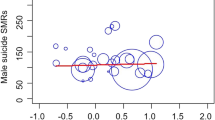Abstract
The purpose of the present study was to evaluate the association between lithium levels in the public water supply and incidences of homicide in Greece. A total of 149 samples of drinking water were collected from 34 out of 52 prefectures, and data for homicides were taken from National Statistic Service of Greece (Hellenic Statistical Authority - EL.STAT). The average lithium level was 11.10 μg/l (SD = 21.16). The results indicate that there is a tendency for lower mean number of homicides in the prefectures with high levels of lithium in drinking water (R 2 = 0.054, β = −0.38, p = .004). Considering the results of our previous study, which showed an inverse association between the lithium levels in drinking water and the incidence of suicide, homicide, rape, and drug abuse, we suggest that natural lithium level intake may influence impulsiveness, a factor that mediate to the manifestation of both suicidality and aggressiveness.

Similar content being viewed by others
References
Cade JFJ (1949) Lithium salts in the treatment of psychotic excitement. Med J Aust 2:349–352
Sheard MH (1975) Lithium in the treatment of aggression. J Nerv Ment Dis 160:108–118
Rapoport SI, Basselin M, Kim HW, Rao JS (2009) Bipolar disorder and mechanisms of action of mood stabilizers. Brain Res Rev 61(2):185–209
Fazel S, Zetterqvist J, Larsson H, Långström N, Lichtenstein P (2014) Antipsychotics, mood stabilisers, and risk of violent crime. Lancet 384(9949):1206–1214
Schrauzer GN, Shrestha KP (1990) Lithium in drinking water and the incidences of crimes, suicides and arrests related to drug addictions. Biol Trace El Res 25:105–113
Stefansson A, Gunnarsson I, Giroud N (2007) New methods for the direct determination of dissolved inorganic, organic and total carbon in natural waters by reagent-free ion chromatography and inductively coupled plasma atomic emission spectrometry. Anal Chim Acta 582:69–74
Helbich M, Leitner M, Kapusta N (2012) Geospatial examination of lithium in drinking water and suicide mortality. Int J Health Geogr 11(19):1–8
Schrauzer GN (2002) Lithium: occurrence, dietary intakes, nutritional essentiality. J Am Coll Nutr 21:14–21
Young W (2009) Review of lithium effects on brain and blood. Cell Transplant 18(9):951–975
Forlenza OV, de Paula VJ, Machado-Vieira R, Diniz BS, Gattaz WF (2012) Does lithium prevent Alzheimer’s disease? Drugs Aging 29(5):335–342
Diniz BS, Machado-Vieira R, Forlenza OV (2013) Lithium and neuroprotection: translational evidence and implications for the treatment of neuropsychiatric disorders. Neuropsychiatr Dis Treat 9:493–500
Luo J (2010) Lithium-mediated protection against ethanol neurotoxicity. Front Neurosci 28:4–41
Ohgami H, Terao T, Shiotsuki I, Ishii N, Iwata N (2009) Lithium levels in drinking water and risk of suicide. Br J Psychiatry 194:464–465
Kabacs N, Memon A, Obinwa T, Stochl J, Perez J (2011) Lithium in drinking water and suicide rates across the East of England. Br J Psychiatry 198:406–407
Kapusta ND, Mossaheb N, Etzersdorfer E, Hlavin G, Thau K, Willeit M, Praschak-Rieder N, Sonneck G, Leithner-Dziubas K (2011) Lithium in drinking water is inversely associated with suicide mortality. Br J Psychiatry 198:346–350
Giotakos O, Nisianakis P, Tsouvelas G, Giakalou V (2013) Lithium in the public water supply and suicide mortality in Greece. Biol Trace Elem Res 156:376–379
Schrauzer GN, de Vroey E (1994) Effects of nutritional lithium supplementation on mood: a placebo-controlled study with former drug users. Biol Trace Elem Res 40(1):89–101
Fierro AA (1988) Natural low dose lithium supplementation in manic-depressive disease. Nutr Perspectives 10–11
Jiménez E, Arias B, Mitjans M, Goikolea JM, Roda E, Ruíz V, Pérez A, Sáiz PA, Paz García-Portilla M, Burón P, Bobes J, Vieta E, Benabarre A (2014) Association between GSK3β gene and increased impulsivity in bipolar disorder. Eur Neuropsychopharmacol 24(4):510–8. doi:10.1016/j.euroneuro.2014.01.005
Cipriani A, Hawton K, Stockton S, Geddes JR (2013) Lithium in the prevention of suicide in mood disorders: updated systematic review and meta-analysis. BMJ 27(346):f3646
Klemfuss H, Schrauzer GN (1995) Effects of nutritional lithium deficiency on behavior in rats. Biol Trace Elem Res 48(2):131–139
Schrauzer GN, Shrestha KP, Flores-Arce MF (1992) Lithium in scalp hair of adults, students, and violent criminals. Biol Trace Elem Res 34(2):161–176
Müller-Oerlinghausen B, Felber W, Berghöfer A, Lauterbach E, Ahrens B (2005) The impact of lithium long-term medication on suicidal behavior and mortality of bipolar patients. Arch Suicide Res 9:307–319
Zarse K, Terao T, Tian J, Iwata N, Ishii N, Ristow M (2011) Low-dose lithium uptake promotes longevity in humans and metazoans. Eur J Nutr 50(5):387–389
Acknowledgments
The authors would like to acknowledge the following:
•  SPECIFAR - ACTAVIS PHARMACEUTICALS, for the collection of water samples.
SPECIFAR - ACTAVIS PHARMACEUTICALS, for the collection of water samples.
• Center of Biological Research of Armed Forces, 414 Hospital of Athens, for the analysis of water samples.
• National Statistic Service of Greece (Hellenic Statistical Authority - EL.STAT), for its contribution in providing the database regarding homicides in Greece during 2007–2011 at the prefecture level.
• Tsouvelas George who is supported by a grant from “Alexander S. Onassis” Public Benefit Foundation for doctoral studies.
• Nissiannakis Paul, Chemist, MSc, Center of Biological Research of Armed Forces, 414 Military Hospital of Athens.
• Giakalou Vera-Varvara, Molecular Neuroscientist, as the corresponding author for bibliography research (Medline, PubMed literature search) regarding the investigation on the role of lithium and for her contribution of rewriting the manuscript according to the Editor’s guidance and instructions according to BTER for submission criteria.
• Lavdas, Alexandros A, MSc, PhD, Neuroscientist, Senior Researcher at EURAC, Italy, for bibliography research and his recommendations.
Conflict of Interest
The authors do not have financial or nonfinancial competing interests in publishing this article.
Author information
Authors and Affiliations
Corresponding author
Rights and permissions
About this article
Cite this article
Giotakos, O., Tsouvelas, G., Nisianakis, P. et al. A Negative Association Between Lithium in Drinking Water and the Incidences of Homicides, in Greece. Biol Trace Elem Res 164, 165–168 (2015). https://doi.org/10.1007/s12011-014-0210-6
Received:
Accepted:
Published:
Issue Date:
DOI: https://doi.org/10.1007/s12011-014-0210-6




